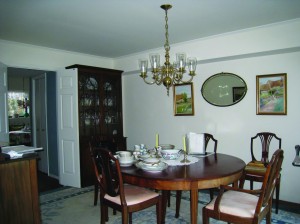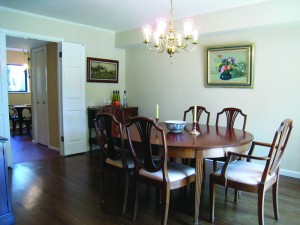Setting the stage for home sellers
There are not many people who can say that the Great Recession of 2007-09 laid a good foundation for their new business, especially those in the real estate sector.
But that was the case for Susan E. Atwell, who left a 15-year career in information technology and started her home staging company AtWell Staged Home in January 2008.
Around that time, houses on the market were losing value, owners and brokers were struggling to sell and the boom of house flipping and bidding wars had come to a grinding halt.

- Susan Atwell staged a client”™s dining room in Rye with a fresh coat of paint, taking away clutter and swapping out art. (BEFORE).
Atwell, who operates her business out of her home in Somers, said, “It was so hard back in 2008, 2009 for people to price their homes because things kept going down and they were always at the last price point.”
That was the case for one of Atwell”™s first clients, a couple who had been trying to sell their home in Katonah for 14 months.
“They kept chasing the market, chasing, chasing, chasing with the price,” she said, until eventually the couple told their real estate agent they couldn”™t bring the price down any more. “The agent was like, ”˜Well, would you be willing to try staging?”™”
The client paid Atwell $1,000 for her consultation in June 2009 and she created a staging plan for how to redesign the house and make improvements. After two weeks, the house went back on the market. It sold in four days for $697,000, down from the original price of $715,000, but not lower than the price the couple and agent had agreed on.
It was that desperation felt by many home sellers that helped put Atwell and her new business on the map, especially with real estate agents, who often are the ones referring clients to stagers.

- Susan Atwell staged a client”™s dining room in Rye with a fresh coat of paint, taking away clutter and swapping out art. (AFTER).
Today, Atwell”™s clients ”” many are in Rockland, Westchester, Putnam and Fairfield counties ”” are making thousands of dollars in staging and home improvement investments and selling their homes above their asking price.
The link between refurbishing and success in selling homes has been noticed by Fiona Dogan, a realtor in the Rye office of Julia B. Fee Sotheby”™s International Realty. Dogan said she has seen the staging industry boom in Westchester County in the last couple of years. “People are starting to realize that in order to get top dollar, they have to keep up with the Joneses,” she said.
One of the reasons more turnkey homes are selling ”” houses that only require buyers to turn the key to the front door and move in, rather than purchasing a home that needs work ”” has to do with social media and the way buyers are shopping. Dogan said.
“The link between the buyer, the stager and how young people are buying online is incredibly important because it gets them in the door,” she said.
Young potential homebuyers are scanning Instagram, Pinterest or the HGTV channel where they see the trendiest furniture, art and designs. When millennials begin their homebuying seach, they vet the photos online first before even getting to the doorstep for an in-person look.
“They”™re totally buying into a whole lifestyle that you”™re offering them online,” Dogan said. “Staging is incredibly important in today”™s world because of the photography. Because almost 100 percent of buyers are shopping online, so the first time they see a house is online and if that photo doesn”™t look like an HGTV flick, they won”™t even go in.”
The presence of staging on TV and social media also has helped Atwell”™s business. Now she is getting more calls from home sellers, whereas previously most of her referrals came from from real estate agents.
“It”™s just the last couple of years where people are seeing (staging) more and more on HGTV and the actual home sellers are starting to call,” she said. “But that”™s what”™s interesting is that even though the market got better, the business seemed to get better, and you would think that in a bad market it would have been at its best.”
Atwell said her business doubled in 2014 from the previous year and that 2015 has been even busier.
The realization for people who want to sell their homes, she said, is that staging is becoming a must-do in this suburban market.
Another way to put it, she said: “It”™s always the unstaged homes that sell the staged homes.”